21 Dec 2023 - {{hitsCtrl.values.hits}}
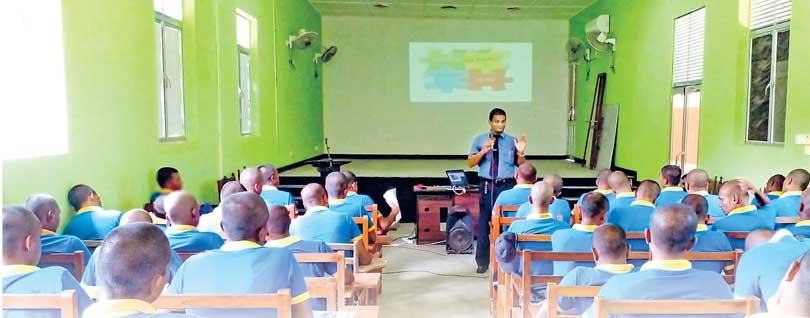
Inmates at the Kandakadu Drug and Rehabilitation Center attending a lecture on Communicable and Non-Communicable Diseases (Image courtesy - BCGR)
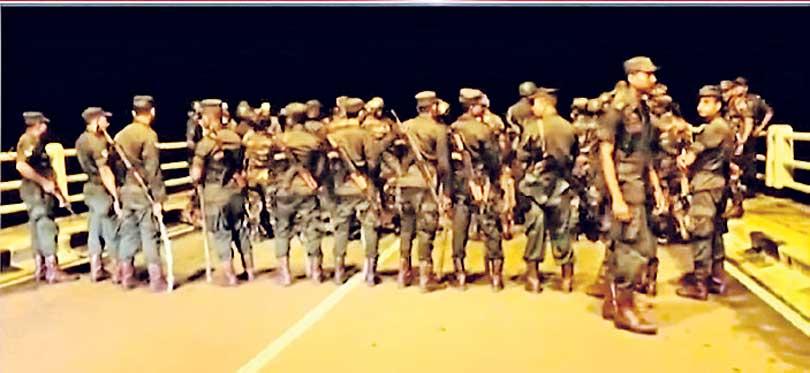
Security forces deployed to find inmates who escaped the centre on December 11
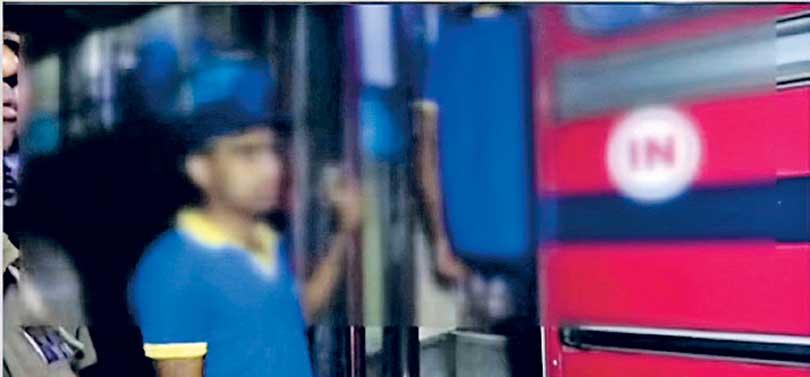
Kandakadu inmates surrendering to the Police following the incident on December 11
Since the so-called ‘War on Drugs’ has taken a brutal turn Sri Lanka not only adopted a militarised approach to curb the menace it has violated the rights of many drug offenders who are being rehabilitated
In June 2022, around 400 ‘inmates’ escaped the centre
 Back in 2019, during one of his visits to the Philippines, the then President Maithripala Sirisena praised Philippine President Rodrigo Duterte’s approach to control the drug menace; an approach that had allegedly led to thousands of extrajudicial killings at the time. Sirisena not only said that it had set an example to the world, but said that he should consider adopting similar approaches to eradicate the drug menace in Sri Lanka. Since then this so-called ‘War on Drugs’ had taken a more brutal and an ugly turn. Sri Lanka not only adopted a militarised approach to curb the drug menace, but it had already violated the rights of many drug offenders who are being sent for rehabilitation. Further aggravating the situation at hand, Minister of Public Security Tiran Alles recently said that ‘maximum force’ would be used to apprehend drug dealers and organised criminals while giving security forces an ultimatum to completely end the drug menace by June 30, 2024.
Back in 2019, during one of his visits to the Philippines, the then President Maithripala Sirisena praised Philippine President Rodrigo Duterte’s approach to control the drug menace; an approach that had allegedly led to thousands of extrajudicial killings at the time. Sirisena not only said that it had set an example to the world, but said that he should consider adopting similar approaches to eradicate the drug menace in Sri Lanka. Since then this so-called ‘War on Drugs’ had taken a more brutal and an ugly turn. Sri Lanka not only adopted a militarised approach to curb the drug menace, but it had already violated the rights of many drug offenders who are being sent for rehabilitation. Further aggravating the situation at hand, Minister of Public Security Tiran Alles recently said that ‘maximum force’ would be used to apprehend drug dealers and organised criminals while giving security forces an ultimatum to completely end the drug menace by June 30, 2024.
Compulsory drug rehabilitation
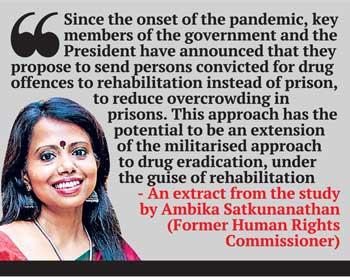 In her research titled ‘A Broken System: Drug Control, Detention and Treatment of People Who Use Drugs in Sri Lanka’ former Human Rights Commissioner Ambika Satkunanathan presents a detailed insight to the brutalities that exist in drug prevention approaches in the country.
In her research titled ‘A Broken System: Drug Control, Detention and Treatment of People Who Use Drugs in Sri Lanka’ former Human Rights Commissioner Ambika Satkunanathan presents a detailed insight to the brutalities that exist in drug prevention approaches in the country.
In terms of the law, the Drug Dependent Persons (Treatment and Rehabilitation) Act (No. 54 of 2007) governs the legal framework for drug rehabilitation in Sri Lanka. Section 10 of the Act empowers police officers to send any person suspected of consuming drugs for a medical assessment, and thereafter produce the person before a Magistrate. Section 10 (4) allows a Magistrate to send the person for compulsory drug rehabilitation, either on the basis of the medical assessment conducted by a medical officer who assesses the person to be “drug-dependent’’, or as a punishment for an offence under the Poisons, Opium and Dangerous Drugs Ordinance. Section 10 allows the police to arrest without evidence, arbitrarily detain a person, ultimately leading to the person being sentenced to compulsory drug rehabilitation.
In her study she explains that international human rights instruments promote a human rights-based public health approach to drug treatment, which involves community-based treatment and care, evidence-based medicines and harm reduction interventions. “Consent to the treatment and the right to withdraw from treatment at any time form the core of this approach. A strategy that requires persons to undergo abstinence-based drug treatment, without any medication or harm reduction interventions to ease withdrawal symptoms, such as in Sri Lanka, can constitute torture, cruel, inhuman and degrading treatment or punishment under international human rights law,” the study reads.
Satkunanathan further observes that compulsory drug treatment and rehabilitation is contrary to international human rights standards and constitutes arbitrary detention, as well as a 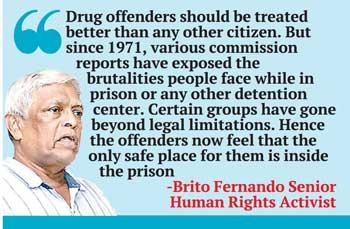 violation of the right to the highest attainable standard of healthcare. “Since the onset of the pandemic, key members of the government and the President have announced that they propose to send persons convicted for drug offences to rehabilitation instead of prison, to reduce overcrowding in prisons. This approach has the potential to be an extension of the militarised approach to drug eradication, under the guise of rehabilitation,” the study further states.
violation of the right to the highest attainable standard of healthcare. “Since the onset of the pandemic, key members of the government and the President have announced that they propose to send persons convicted for drug offences to rehabilitation instead of prison, to reduce overcrowding in prisons. This approach has the potential to be an extension of the militarised approach to drug eradication, under the guise of rehabilitation,” the study further states.
The Kandakadu story
On December 11 around 139 drugs offenders escaped the Kandakadu Drug and Rehabilitation Center. But this is not the first time such an incident occurred. In June 2022, around 400 ‘inmates’ escaped the centre. Although media reports claimed that clashes between groups led to recurrent incidents where offenders tend to escape, some ‘inmates’ claim that they were assaulted and harassed while receiving treatment and they request to be sent to remand prison.
During the incident in 2022, a few offenders who were seen speaking to the cameras claimed that they were being beaten up. Several inmates have died under mysterious circumstances over the years although the offenders allege that their fellow inmates have been murdered. But when such claims were made the authorities responded by saying that the escapees will be produced in courts and an investigation would be launched. However, the outcomes of these investigations have not been revealed to the public.
Such coercive treatments hasten their chances to relapse and it is in this backdrop that drug offenders who are being sent to the Kandakadu Drug Rehabilitation Centre continue to escape.
Legal fraternity, activists demand investigations
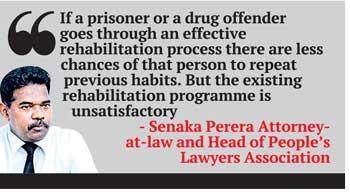 “It is very clear that these offenders have been beaten up by the forces,” said Senior Human Rights Activist Brito Fernando. “They request to be sent to remand prison, but this doesn’t mean that the situation would improve either. Drug offenders should be treated better than any other citizen. But since 1971, various commission reports have exposed the brutalities people face while in prison or any other detention centre. Certain groups have gone beyond legal limitations. Hence the offenders now feel that the only safe place for them is inside the prison,” said Fernando.
“It is very clear that these offenders have been beaten up by the forces,” said Senior Human Rights Activist Brito Fernando. “They request to be sent to remand prison, but this doesn’t mean that the situation would improve either. Drug offenders should be treated better than any other citizen. But since 1971, various commission reports have exposed the brutalities people face while in prison or any other detention centre. Certain groups have gone beyond legal limitations. Hence the offenders now feel that the only safe place for them is inside the prison,” said Fernando.
Fernando further said that it’s the courts that should decide whether an individual is a drug offender or a drug dealer. “If the offenders refuse to seek rehabilitation under the existing system I believe that a new rehabilitation programme should be introduced. In fact those standing for the rights of drug offenders will be labelled similarly to those who stood for the rights of Tamil civilians who faced the brunt of the war at the height of the ethnic conflict. This notion is becoming normalized, but somebody should speak on behalf of human rights violations that these offenders are facing,” he added.
Head of People’s Lawyers Association Attorney-at-law Senaka Perera further reiterated on why the rehabilitation process should be effective. “If a prisoner or a drug offender goes through an effective rehabilitation process there are less chances of that person to repeat previous habits. But the existing rehabilitation programme is unsatisfactory. A rehabilitation centre is in fact a correction centre where it provides custody and care for the inmates while correcting their behaviours to be reintegrated into society,” said Perera.
“In prison or at any other rehabilitation centre just because inmates are being taught various vocations it doesn’t mean that they would be rehabilitated fully. The psychological aspect is 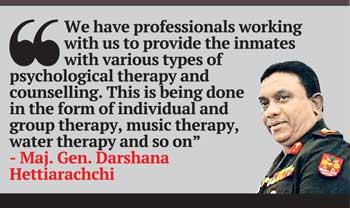 very important. They need to be given proper counseling. Once an inmate is released, a post-release follow up should also be conducted,” Perera added.
very important. They need to be given proper counseling. Once an inmate is released, a post-release follow up should also be conducted,” Perera added.
He further referred to mens rea and actus reus concepts in criminal law. “In criminal law, mens rea is the mental state of a defendant who is accused of committing a crime. In common law jurisdictions, most crimes require proof both of mens rea and actus reus (guilty act) before the defendant can be found guilty,” he explained.
Responding to allegations of harassment and assault made by offenders while serving in rehabilitation centres Perera further said that the government should launch thorough investigations to probe such claims.
Rehab Commissioner denies use of ‘military therapy’
However, when inquired, Commissioner General of Rehabilitation Maj. Gen. Darshana Hettiarachchi said that most people who are being sent to the Kandakadu Rehabilitation Center have been on drugs for 10-15 years. “So it’s very difficult for them to stay without drugs during the first one or two months. They basically live on drugs. They sometimes go home during the festive season and some never return. But people escape from the Centre due to multiple reasons,” said Maj. Gen. Hettiarachchi.
Maj. Gen. Hettiarachchi however denied claims of using military therapy to rehabilitate drug offenders. “We have professionals working with us to provide the inmates with various types of psychological therapy and counselling. This is being done in the form of individual and group therapy, music therapy, water therapy and so on.
“Some drug addicts have tried to kill their own parents. Some are not in their senses. So when they try to escape do you think we could fire at them,” Hettiarachchi questioned while referring to incidents of inmates escaping the premises. “We try to use minimum force all the time. The Army has been deployed to control them to some extent because we believe that they would remain calm when they see the uniform. But we need to be patient when we deal with them,” he added.
The inmates have to work according to a timetable once they are at the centre. On a typical day at the Kandakadu Center, inmates are supposed to wake up at 5.00 am, have a wash, do physical training, have breakfast, sit through a counselling session followed by a lecture, have lunch, sit through another lecture, play games, then have a wash, watch TV, have dinner and return to bed by 10.00pm.
Hettiarachchi further said that the rehabilitation period for each inmate is decided by the courts. “It’s either six months or one year. At the end of six months we conduct an evaluation to check if a person is suitable to be sent back to society. If they fail the evaluation they would be retained for another six months,” he said.
At present, there are 485 inmates at the Kandakadu Rehabilitation Center. When asked if there’s a spike in the number of inmates being sent to the Kandakadu Drug Rehabilitation Center on charges of drug related offenses Hettiarachchi responded in the affirmative. “Large numbers are being sent from the Gampaha Magistrates court for instance,” he said.
Public Security Minister recently launched the ‘Yukthiya’ (Justice) operation to eradicate drugs and the underworld, but one may also have doubts about justice being delivered to offenders if ‘maximum force’ is being used.
29 Apr 2024 1 hours ago
29 Apr 2024 1 hours ago
29 Apr 2024 3 hours ago
29 Apr 2024 5 hours ago
28 Apr 2024 28 Apr 2024